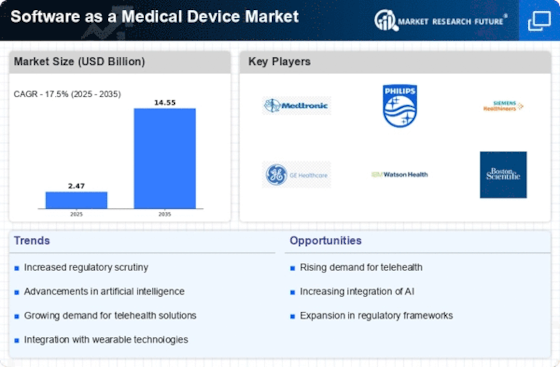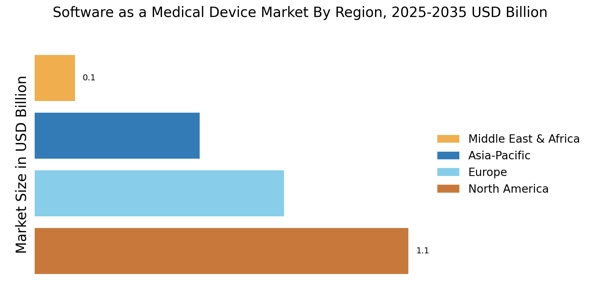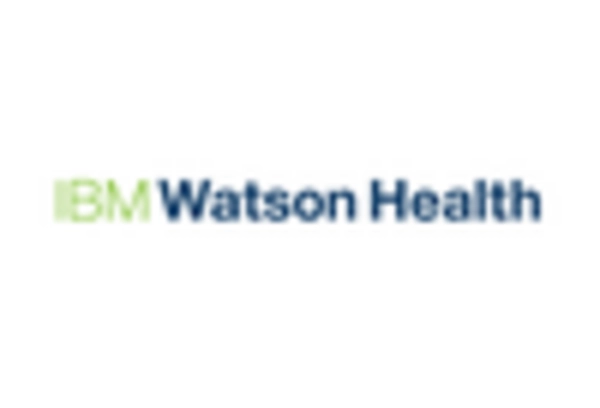Growing Focus on Patient-Centric Solutions
The Software as a Medical Device Market is witnessing a growing focus on patient-centric solutions, which prioritize the needs and preferences of patients in the design and implementation of medical devices. This shift is largely influenced by the increasing demand for personalized healthcare experiences. As patients become more involved in their own care, the development of software that enhances user experience and engagement is becoming paramount. Market data indicates that patient engagement solutions are expected to grow by 20% annually, reflecting the industry's commitment to improving patient satisfaction and outcomes. This trend is likely to drive innovation within the Software as a Medical Device Market, as companies strive to create solutions that resonate with patients.
Increasing Demand for Remote Patient Monitoring
The Software as a Medical Device Market is experiencing a notable surge in demand for remote patient monitoring solutions. This trend is largely driven by the need for continuous health monitoring, particularly for chronic conditions. According to recent data, the market for remote patient monitoring is projected to reach USD 2.5 billion by 2026, indicating a compound annual growth rate of approximately 25%. This growth is fueled by advancements in wearable technology and mobile health applications, which enable patients to track their health metrics in real-time. As healthcare providers increasingly adopt these technologies, the Software as a Medical Device Market is likely to expand, offering innovative solutions that enhance patient engagement and improve health outcomes.
Regulatory Support for Digital Health Innovations
The Software as a Medical Device Market is benefiting from enhanced regulatory support for digital health innovations. Regulatory bodies are increasingly recognizing the potential of software-based medical devices to improve healthcare delivery. Recent initiatives aim to streamline the approval process for these technologies, thereby encouraging investment and innovation. For instance, the FDA has introduced guidelines that facilitate the development and deployment of software as a medical device, which is expected to accelerate market growth. As regulatory frameworks evolve, the Software as a Medical Device Market is likely to see an influx of new products that meet stringent safety and efficacy standards, ultimately enhancing patient care.
Advancements in Machine Learning and Data Analytics
The Software as a Medical Device Market is significantly influenced by advancements in machine learning and data analytics. These technologies facilitate the development of sophisticated algorithms that can analyze vast amounts of health data, leading to improved diagnostic accuracy and personalized treatment plans. The integration of machine learning into medical devices is expected to enhance decision-making processes for healthcare professionals. As of 2025, the market for AI-driven medical devices is anticipated to grow at a rate of 30%, reflecting the increasing reliance on data-driven insights in clinical settings. This trend suggests that the Software as a Medical Device Market will continue to evolve, driven by the need for more efficient and effective healthcare solutions.
Integration of Internet of Things (IoT) in Healthcare
The Software as a Medical Device Market is increasingly integrating Internet of Things (IoT) technologies, which enable seamless connectivity between medical devices and healthcare systems. This integration allows for real-time data exchange, enhancing the ability to monitor patient health and respond to emergencies promptly. The IoT in healthcare market is projected to reach USD 100 billion by 2026, indicating a robust growth trajectory. This trend suggests that the Software as a Medical Device Market will continue to expand as healthcare providers adopt IoT-enabled solutions to improve operational efficiency and patient outcomes. The potential for enhanced data collection and analysis through IoT devices may lead to more informed clinical decisions.

















